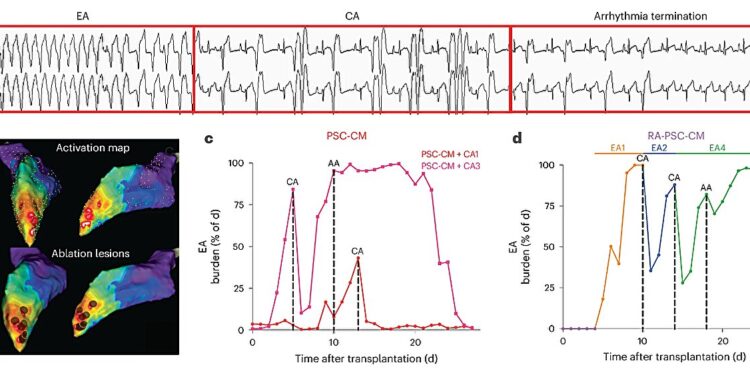CA is a feasible and effective EA treatment strategy. a, Representative rhythm strip showing the end of the EA during the AC. b, Electroanatomical maps of a representative subject treated with CA. Top, EA activation map showing the anatomical origin of the arrhythmia (early activation, white; late activation, purple). Bottom, activation map overlaid with ablation lesions (brown circles) that were delivered to the earliest activation sites, resulting in termination of the arrhythmia. c, d, Graphs illustrating the percentage of the day spent in ventricular arrhythmia for PSC-CM (c) or RA-PSC-CM (d) recipients treated with CA. Credit: Nature Cardiovascular Research (2024). DOI: 10.1038/s44161-023-00419-3
New research at the Westmead Institute for Medical Research (WIMR) has resolved a complication that could arise following an experimental procedure to repair damaged heart muscle. Currently, when a heart muscle is repaired with stem cells, there is a risk of developing an abnormal heart rhythm. The research, carried out in animal models, discovered a way to identify cells likely to have an abnormal beating and that a combination therapy of existing drugs can control and potentially stop this abnormality.
In 2014, Professor James Chong led a research team at WIMR that used stem cells to successfully grow new heart muscle in animal models, to repair damage caused by a heart attack.
Professor Chong, co-director of the WIMR Cardiac Research Centre, consultant interventional cardiologist at Westmead Hospital and professor of cardiovascular medicine at the University of Sydney School of Medicine and Health, says there is currently no way to regenerate heart muscle that has been seriously injured or died from a heart attack.
“Currently, damaged or dead heart muscles cannot be significantly replaced, so a heart transplant is the only ‘cure’ available for patients with end-stage heart disease. However , not all patients are eligible for a transplant, and donor organs are rare. So the ability to replace a new, healthy heart muscle with a graft created using stem cells could save thousands of lives,” says Chong.
The Australian Institute of Health and Welfare estimates that in 2021, cardiovascular disease was the underlying cause of 42,700 deaths (25% of all deaths) in Australia.
Resolve a life-threatening complication
A potential complication has been identified in stem cell-derived heart muscle transplants: ventricular arrhythmias. Ventricular arrhythmias cause the heart to beat too quickly, which prevents oxygen-rich blood from flowing to the brain and body and can lead to cardiac arrest.
Professor Chong is the lead author of new research now published in Nature Cardiovascular Research.
“We identified the factors that contribute to these ventricular arrhythmias in animal models, and determined that existing clinical treatment strategies can control and potentially suppress these arrhythmias,” explains Professor Chong.
Research shows that the type of stem cells used and how they grow into new heart muscle may be a cause of ventricular arrhythmia.
Professor Chong said: “We detected specific cardiomyocytes (a type of heart muscle cell) that contribute to these ventricular arrhythmias, and we were able to identify two unique surface marker signatures (SIRPA+/CD90-/CD200+ and SIRPA+/ CD90-/CD200).
“This allows us to differentiate between arrhythmogenic and non-arrhythmogenic cardiomyocytes, respectively, meaning we can choose cells that are least likely to lead to a fatal ventricular arrhythmia.”
In terms of treating these ventricular arrhythmias, the research team showed that a combination therapy of existing drugs can provide the required control.
Professor Chong explains: “When combined, amiodarone (a medicine which acts directly on heart tissue to slow nerve impulses in the heart) and ivabradine (a medicine used to treat heart failure by slowing the heart rate) significantly reduced the incidence. ventricular arrhythmia following this transplant process.
According to Professor Chong, with the planning and recruitment of human clinical trials of stem cell-derived heart muscle transplants underway around the world, including at Westmead, there is an urgent unmet need to understand why these arrhythmias occur and to develop treatment strategies to control or prevent these engraftment arrhythmias.
“We are delighted that our research results help overcome a significant barrier to the successful application of stem cell-derived heart muscle transplants in humans,” Professor Chong said.
More information:
Dinesh Selvakumar et al, Cellular heterogeneity of pluripotent stem cell-derived cardiomyocyte grafts is mechanistically linked to treatable arrhythmias, Nature Cardiovascular Research (2024). DOI: 10.1038/s44161-023-00419-3
Provided by Westmead Institute for Medical Research
Quote: Treating and preventing abnormal heartbeats with muscle stem cell transplants (February 6, 2024) retrieved February 6, 2024 from
This document is subject to copyright. Apart from fair use for private study or research purposes, no part may be reproduced without written permission. The content is provided for information only.



